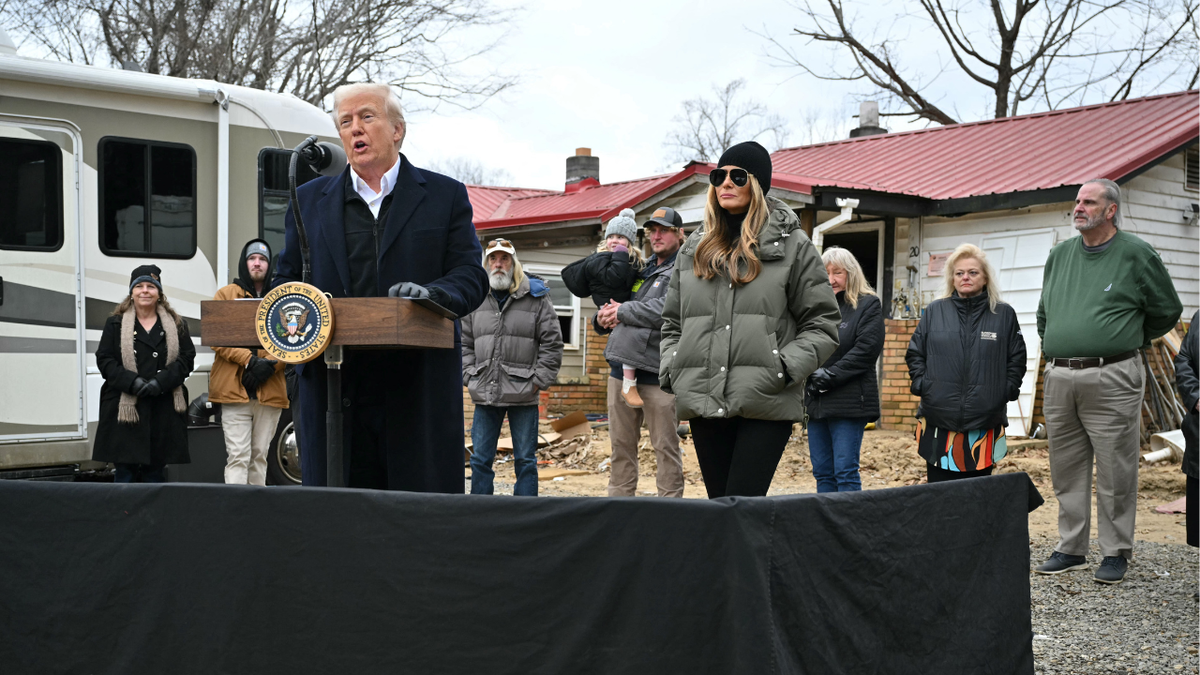NEWYou can now listen to Fox News articles!
It’s been almost a year since Hurricane Helene reshaped Western North Carolina and Southern Appalachia. But as a native of that region, I remember it like it was yesterday: the reports of catastrophic flooding, thousands of mudslides, and infrastructure failures — from interstate closures to cell towers being offline.
Four days after the storm, I had still not heard from my parents. Cell service across the region was down, power was still out, and there was no way in or out. They were stranded five hours away, and I had no idea if they were OK.
When I loaded up my truck with extra gas tanks, cases of water, food and toiletries, I had no idea if I was even going to make it home.
DHS JUGGLES ‘MASS DEPORTATION’ PUSH WITH HELENE RELIEF, ADDS $124M AFTER BIDEN BACKLASH
It was not until I had gotten to Raleigh that I heard I-26 had reopened for traffic into the region. Not 30 minutes later, for the first time in a week, I heard from my brother, who told me my family was safe.

Heavy rains from Hurricane Helene caused record flooding and damage on September 28, 2024, in Asheville, North Carolina. (Photo by Melissa Sue Gerrits/Getty Images)
But many families in our community weren’t so lucky. They lost everything, including their loved ones.
Survivor’s guilt plagued our community as we said goodbye to our friends, family, co-workers, classmates and neighbors and asked, why wasn’t it me?
SENATOR PETER WELCH: I’M A DEMOCRAT AND WE NEED TO FIX FEMA WITH LOCAL CONTROL
Appreciation must be given to lawmakers like Republican North Carolina Sens. Thom Tillis and Ted Budd and Republican Reps. Chuck Edwards, of North Carolina, and Tim Burchett, of Tennessee, who never stopped fighting to deliver aid to our region.
In the immediate aftermath of the storm, President Donald Trump and Vice President JD Vance made it their mission to bring awareness to Appalachia. Republican Party Chairman Michael Whatley, who is now running for Senate, fought to ensure Western North Carolinians could vote despite many polling locations being destroyed by the flooding.
Southern Appalachia has overcome a lot since then, and a lot of the credit belongs to private citizens, not just federal officials.
The Biden administration failed to act swiftly immediately following the storm, and our region relied on the goodwill of volunteers, celebrities and billionaires to connect our community with the outside world.
HELENE-RAVAGED RIVER TOWN REOPENS FOR VISITORS: ‘IT FELT LIKE VICTORY’
Still, today, credit must be given to the brave civilians who dropped everything to help.
It was Elon Musk, not the federal government, who delivered Starlink across the region so they could connect with the outside world.



President Donald Trump speaks while visiting a neighborhood affected by Hurricane Helene in Swannanoa, North Carolina, on January 24, 2025. (Photo by MANDEL NGAN/AFP via Getty Images)
And it wasn’t the federal government that delivered food, supplies and water to families stranded with no way to cross the river. It was former NASCAR driver Greg Biffle and the Cajun Navy.
And who delivered warm meals on horseback and scraped mud out of ruined buildings? Churches, nonprofits and universities — not the federal government.
DAVID MARCUS: IN WAKE OF KERRVILLE FLOOD, LOCALS IGNORE BLAME GAME
Families who suffered their own loss during the storm dropped what they were doing to check on their elderly neighbors and family members who had no way of communicating whether they were safe or distressed.
Instead of waiting for the federal government to act, our community banded together, threw our differences aside and rolled up our sleeves to restore our way of life.
I have spoken to several of our local officials who are still waiting for the help everyone says is coming. Whether it be homes from FEMA for families who have already been approved or businesses that are waiting on relief disbursements, our community is still waiting on the assistance they have been promised.
For generations, Appalachia has suffered the consequences of broken promises by the federal government. That all changed last November as communities throughout the region sent a message to Washington that they will not be forgotten any longer.
VOLUNTEERS HELP REBUILD NORTH CAROLINA HOMES 10 MONTHS AFTER HURRICANE HELENE
In the first official trip of his second term — just three days after his inauguration — Trump visited Western North Carolina to see the devastation, and the progress, firsthand. He immediately signed an executive order to streamline FEMA priorities and competency.
CLICK HERE FOR MORE FOX NEWS OPINION
It was at that moment that the tide began to shift. His message to our community reignited hope.
Instead of waiting for the federal government to act, our community banded together, threw our differences aside and rolled up our sleeves to restore our way of life.
In the months after his visit, the federal government began to work faster. The elimination of regulation and the complete support from the White House helped Western North Carolina get through the initial cleanup phase into the revival phase.
Helene devastated two of my county’s three towns. In May of this year, both towns held reopening ceremonies to celebrate an incredible milestone.
Southern Appalachia is still rebuilding, but the progress we have experienced must be celebrated. Towns have reopened, shops are being rebuilt, and families are beginning to feel a new normal.
CLICK HERE TO GET THE FOX NEWS APP
We celebrate the hard work, dedication and sacrifice made by so many throughout Western North Carolina who have selflessly committed a year of their lives to rebuilding and restoring our region.
The revival of Southern Appalachia is a testament to the strength and resilience of Appalachians. We stepped up when our neighbors needed us most, and we are stronger because we never let adversity keep us down.
CLICK HERE TO READ MORE FROM JAKE MATTHEWS








